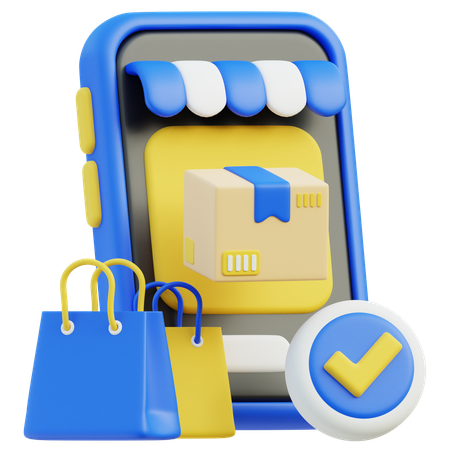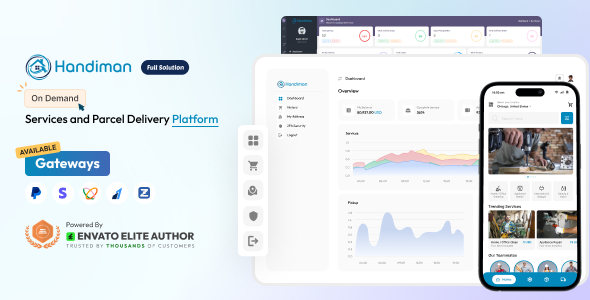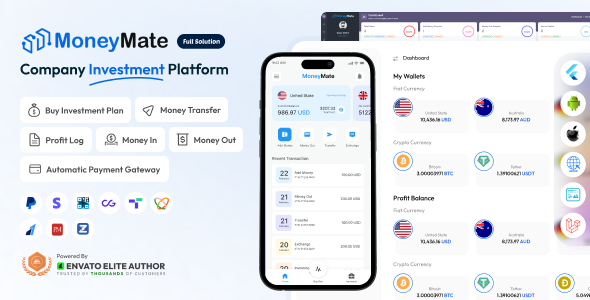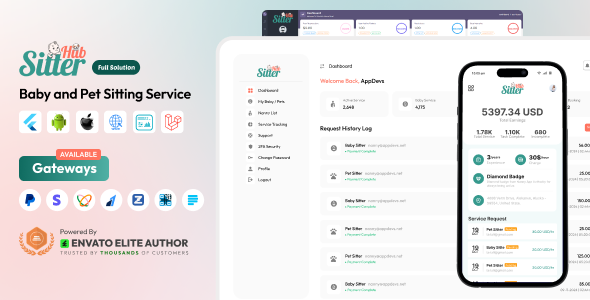Transform Your Business with Our Multi-Vendor Solutions
Empower your eCommerce platform with Multi-Vendor Solutions by AppDevs. Our advanced system enables multiple vendors to sell on a unified marketplace, streamlining product management, order processing, and payments. Offer customers a diverse shopping experience while giving vendors complete control over their storefronts—all within a single platform.What Problems Does a Multi-Vendor Solution Solve?
Limited Product Offerings
Expand your marketplace by allowing multiple vendors to list and sell a wide range of products, offering customers more variety.
Manual Vendor Management
Automates vendor registration, product listing, and order processing, saving time for administrators and streamlining operations.
Inefficient Payment Processes
Centralizes payments and integrates a secure payment gateway that handles individual vendor payments automatically.
Lack of Vendor Control
Provides vendors with dedicated dashboards to manage their products, inventory, pricing, and orders independently.
Poor Customer Experience
Enhances the user experience by offering a variety of products from different vendors, all within one easy-to-navigate platform.
Marketplace Scaling Challenges
Simplifies scaling by allowing you to onboard an unlimited number of vendors and manage them from a single admin panel.
Key Features of a Multi-Vendor Solution
A comprehensive multi-vendor platform should serve both administrative and user needs, ensuring security, efficiency, and ease of use.
Administrator Features

Centralized Dashboard
View and manage all vendors, products, orders, and payments from a single platform.

Vendor Management System
Approve or reject vendor applications, set commissions, and track vendor performance.

Product Approval and Moderation
Admins can review and approve products before they are listed on the marketplace, ensuring quality control.

Multi-Language and Multi-Currency Support
Cater to a global audience with support for multiple languages and currencies.

Detailed Reporting and Analytics
Track overall marketplace performance, vendor sales, and customer behavior to optimize business strategies.

Order and Shipping Management
Easily manage order statuses, shipping methods, and vendor shipments through a unified admin interface.
User Interface Features

Vendor Dashboard
Allow vendors to manage their products, track sales, and view customer feedback, all from their own personalized dashboard.

Product Listing and Management
Vendors can add, edit, or remove products and manage stock levels directly from the interface.

Secure Payment Gateway
Integrate payment gateways like PayPal, Stripe, and others to handle secure transactions for each vendor.

Product Search and Filter Options
Enable users to search for products by categories, brands, and prices, enhancing the overall shopping experience.

Customer Reviews and Ratings
Allow customers to rate and review products from vendors, helping others make informed purchasing decisions.

Order Tracking
Provide customers with the ability to track orders in real time from different vendors, improving transparency.
How Can Businesses Generate Profit from a Multi-Vendor Solution?

Commission on Sales
Charge vendors a percentage of each sale they make through the platform, ensuring ongoing revenue.
Subscription Plans for Vendors
Offer subscription plans for vendors to access premium features, enhanced visibility, or priority listing options.
Advertisement Fees
Enable vendors to pay for advertisements to boost their product visibility or place banner ads on the platform.
Transaction Fees
Charge a small fee for each transaction made on the platform, providing a steady revenue stream.


Steps to Start a Multi-Vendor Business
Launching a multi-vendor solution involves several key steps to ensure smooth implementation and adoption.

Identify Your Niche

Choose a Platform

Vendor Onboarding

Set Commission Rates and Payment Methods

Marketing and Promotions

Provide Customer Support
Key Requirements for Launching a Multi-Vendor Solution
To successfully launch a multi-vendor platform, consider these essential requirements
Customizable eCommerce Platform
Choose a platform that allows easy integration of multi-vendor functionality and customization.
Secure Payment Gateway
Implement a reliable and secure payment gateway to handle transactions for multiple vendors.
Scalable Infrastructure
Ensure your hosting infrastructure is scalable to support growing traffic and vendor registrations.
Legal and Compliance Requirements
Draft terms and conditions, privacy policies, and vendor agreements to ensure legal compliance.
Effective Marketing Strategy
Develop an online marketing plan to promote your marketplace to both vendors and customers.
Customer Service Setup
Implement a customer service system to handle disputes, complaints, and feedback from both vendors and customers.
Built with Leading-Edge Technology
Appdevs is a leading provider of custom financial software development services, catering to a diverse range of businesses within the banking and finance industry.Front-End
![[object Object]](/_next/static/media/next.cb1d90a5.png)
Next.js
Next.js is a popular React-based framework that enables developers to build fast, scalable, and SEO-friendly web applications.
![[object Object]](/_next/static/media/react.89d58278.png)
React.js
React.js is an open-source JavaScript library for building user interfaces.
![[object Object]](/_next/static/media/vue.b105c8ee.png)
Vue.js
Vue.js is a progressive JavaScript framework used for building user interfaces and single-page applications.
Back-End
![[object Object]](/_next/static/media/laravel.bea31879.png)
Laravel
Laravel is a powerful and elegant PHP framework designed for building modern web applications.
![[object Object]](/_next/static/media/nodeJS.5b61e125.png)
Node js
Node.js is a JavaScript runtime environment. Node.js runs on the V8 JavaScript engine.
![[object Object]](/_next/static/media/python.b96758ee.png)
Django
Django is a high-level, open-source web framework written in Python.
Mobile Apps
![[object Object]](/_next/static/media/flutter.e7f646bb.png)
Flutter
Flutter is an open-source UI software development kit created by Google.
![[object Object]](/_next/static/media/reactNative.e1093344.png)
React Native
React Native is a popular open-source framework for building cross-platform mobile applications.
![[object Object]](/_next/static/media/swift.ea425c9c.png)
Swift
Swift is a high-level general-purpose, multi-paradigm, compiled programming.
DevOps
![[object Object]](/_next/static/media/nginx.76aed3a5.png)
Nginx
Nginx is a high-performance, open-source web server, reverse proxy, and load balancer.
![[object Object]](/_next/static/media/apache.2e47b3bd.png)
Apache
The Apache HTTP Server, commonly referred to as Apache, is a powerful, flexible, and open-source web server.
UI/UX Design
![[object Object]](/_next/static/media/figma.6010ec6b.png)
Figma
Figma is a powerful, cloud-based design and prototyping tool that has revolutionized the way designers collaborate.
![[object Object]](/_next/static/media/adobexd.f65e5df9.png)
Adobe XD
Adobe XD is a user experience and user interface design tool developed by Adobe.
![[object Object]](/_next/static/media/sketch.42dd4a93.png)
Sketch
Sketch is a vector-based design tool primarily used for UI/UX design, web, and mobile application design.
Database
![[object Object]](/_next/static/media/mySQL.284661c9.png)
MySQL
MySQL is an open-source relational database management system.
![[object Object]](/_next/static/media/postgreSQL.79bba237.png)
PostgreSQL
PostgreSQL, also known as Postgres, is a free and open-source relational database.
![[object Object]](/_next/static/media/mongoDB.2bc9137c.png)
MongoDB
MongoDB is a source-available, cross-platform, document-oriented database program.
Our Ready-Made Multi-vendor Solutions
For businesses looking for a quick and efficient multi-vendor platform, our pre-built solutions offer a plug-and-play approach with customization options.
Why Choose AppDevs for Multi-Vendor Solutions?
Our ready-made solutions are built by industry experts with years of experience, ensuring a reliable and professional product. Our solutions are designed to meet industry standards and exceed your expectations by leveraging proven methodologies and advanced technologies.
Quick Deployment
Our solutions are pre-built and customizable, allowing for rapid deployment to meet market demands.

Cost-Effective
By choosing a ready-made product, businesses can save on development costs and focus their budgets on marketing and scaling.

Scalability
Each solution is designed to scale with your business, whether you’re starting locally or expanding globally.

















